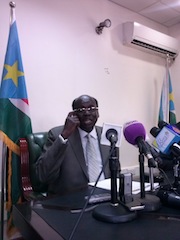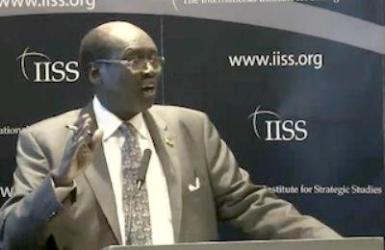International pressure reduces on South Sudan: FM Marial
February 24, 2014 (JUBA) – South Sudan’s foreign affairs minister, Barnaba Marial Benjamin, said on Monday that his government’s image has improved globally following recent his trips abroad.

“The pressure is not as it used to be (on South Sudan),” he said referring to international pressure on his government when the conflict in the country first erupted over two months ago.
Fighting erupted on December 15 at South Sudan Presidential guards unit between soldiers loyal to President Salva Kiir and his former deputy Riek Machar.
President Kiir accuses Machar of staging a coup, an allegation which the later denies.
Foreign governments including the United States said there was no evidence to prove that there was a coup attempt. However, Machar fled Juba shortly after fighting began and have since claimed leadership of the loose coalition of defected soldiers and armed civilians now fighting the government.
“We have done a lot in the ministry of foreign affairs and I think the content we are initiating both bilateral and multilateral as so enormous,” he said.
Although he did not give names, he claimed that some countries now supported the government’s version of events.
Marial recently visited the United Kingdom as part of effort to improve government’s foreign policy, where he made several public appearances but failed to convince analysts or the international press in London of the coup narrative as a way of explaining what caused the fighting in Juba.

During an interview with the BBC and when speaking at speaking at Chatham House and the International Institute for Strategic Studies Marial insisted the Ugandan forces had merely been redeployed from the joint force which was fighting Lord’s Resistance Army rebel group.
However, only days later South Sudan’s defence minister admitted that Juba paying Kampala for its assistance in combating the rebellion.
At both events Marial also repeated the government’s claim that the fighting between members of the presidential guard on December 15 was a “coup attempt” and was not a spontaneous reaction to one group of soldiers being re-armed while others were deliberately excluded.
After listening to Marial speak at Chatham House, Douglas H. Johnson, a researcher and historian specialising in South Sudan affairs, said that too many details surrounding the events in Juba remain unclear or unaddressed.
“The narrative that we were given today about the somewhat accidental killing of people in Juba as a result of the fighting that broke out between the presidential guards, I think it is going to be very difficult for the international community to accept that as the full explanation of what happened”, he told Sudan Tribune.
At the International Institute for Strategic Studies the BBC’s James Copnall pointed out that the African Union is yet to condemned the South Sudan conflict as a coup attempt and also suggested that the international media, analysts and diplomats would need further evidence to convince them of the government’s narrative.
Asked to comment on the alleged visit of rebel leader Riek Machar to the UK, Marial declined, referring reporters to British Embassy in Juba.
(ST)
- ST – South Sudan foreign minister continues London visit
- ST – South Sudan violence was not genocide: minister

